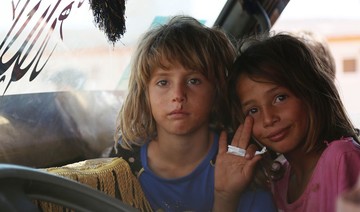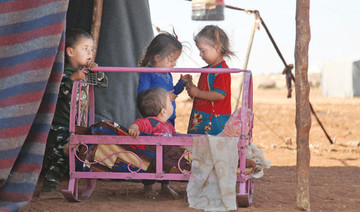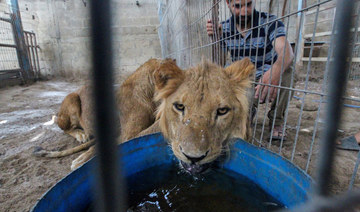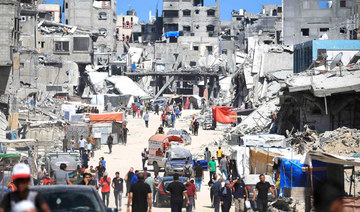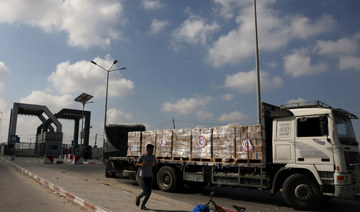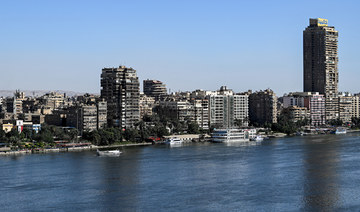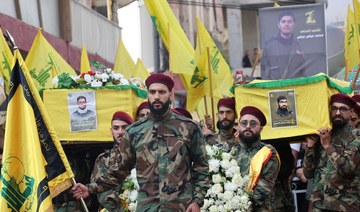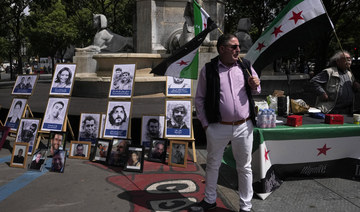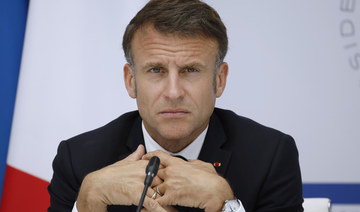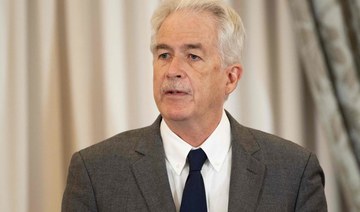KHAN SHAYKHUN: Violence in northwest Syria has displaced more than 30,000 people this month alone, the United Nations said Monday, warning that a looming assault could create the century’s “worst humanitarian catastrophe”.
Idlib province and adjacent rural areas form the largest piece of territory still held by Syria’s beleaguered rebels, worn down by a succession of government victories in recent months.
President Bashar al-Assad has now set his sights on Idlib, and his forces have stepped up bombardment of the densely populated province since the beginning of the month.
That has prompted an estimated 30,452 people to be displaced within Idlib and parts of adjacent Hama province between September 1 and 9, the UN’s humanitarian coordination agency (OCHA) said Monday.
“We’re deeply concerned about this recent escalation of violence, which has resulted in the displacement of over 30,000 in the area. That’s something we’re monitoring very closely,” OCHA spokesman David Swanson told AFP.
Many made a dash for Syria’s northern border with Turkey, with just under half seeking refuge in displacement camps and others living with local families or renting apartments.
An AFP correspondent in Idlib has seen dozens of displaced families head towards the frontier in recent days to escape bombing elsewhere.
On Monday, on the main highway running across the province, men on motorbikes headed north with their children on foot, herding dozens of sheep.
Abu Jassim said he and his family were fleeing the latest bombardment near the southern town of Khan Sheikhun, after already having been displaced several times within the province due to the war.
“They hit with four rockets so we escaped with our flock”, he said.
“We go wherever it’s safe,” said the man in his 30s.
“I have 30 sheep. Every day, I need water, hay and bran to feed them.”
The UN has said as many as 800,000 people could be displaced by a regime assault on Idlib and surrounding areas.
Some three million people live in the zone now, about half of them already displaced by the brutal seven-year war and others heavily dependent on humanitarian aid to survive.
For weeks, regime troops backed by Russia and Iran have massed around Idlib’s periphery, with deadly air strikes, shelling, and barrel bombs falling with increased intensity in recent days.
Russia is due to brief the United Nations Security Council later Tuesday about the results of the Tehran summit it held with Iran and Turkey on the fate of Syria’s Idlib province.
Meanwhile the bombs keep falling.
Two children were killed in heavy barrel bomb attacks on a village in Idlib’s south Sunday, a day after 10 civilians died in shelling across the rebel zone, the Syrian Observatory for Human Rights monitoring group said.
Syria’s conflict has killed more than 350,000 people and forced millions more out of their homes, but the UN has warned a full-blown attack on Idlib could bring unprecedented suffering.
On Monday, its humanitarian chief made an urgent appeal.
“There needs to be ways of dealing with this problem that don’t turn the next few months in Idlib into the worst humanitarian catastrophe with the biggest loss of life in the 21st century,” Mark Lowcock told reporters in Geneva.
He acknowledged that there were many rebels and fighters from “terrorist” groups in the province, but stressed that “there are 100 civilians, most of them women and children, for every fighter in Idlib”.
Idlib is mostly controlled by Hayat Tahrir al-Sham (HTS) -- an alliance spearheaded by powerful extremists once linked to Al-Qaeda.
Its population ballooned as the regime chalked up a series of victories across the country, reaching deals that saw tens of thousands of rebels and civilians bussed into Idlib.
The escalating bombardment has already damaged civilian infrastructure.
At least two hospitals and two centers running rescue operations for wounded people were put out of service by shelling and air strikes, according to the Britain-based Observatory and the Union of Medical Care and Relief Organisations, which backs medical centers in Syria.
The conflict’s three powerbrokers -- regime allies Russia and Iran and rebel backer Turkey -- agreed at a summit last week to “stabilize” Idlib, but few details emerged on how they would do it.
Delegations from the three countries will be in Geneva on Tuesday to meet the UN’s Syria envoy Staffan de Mistura.
Moscow wants to keep rebels from using weaponized drones against Russian warplanes positioned nearby.
Meanwhile Turkey, which already hosts three million Syrian refugees, is keen to prevent an assault that would see hundreds of thousands more mass along its border.
30,000 flee in Syria as UN fears century’s ‘worst’ crisis
30,000 flee in Syria as UN fears century’s ‘worst’ crisis

- Idlib province and adjacent rural areas form the largest piece of territory still held by Syria’s beleaguered rebels
- The UN has said as many as 800,000 people could be displaced by a regime assault on Idlib and surrounding areas
Egyptian sports critic to sue authorities in Israel after Shin Bet confuses him with Hamas member

- Media expert Hassan Makawi says simple Internet search would have uncovered ‘appalling mistake’
- He says fiasco shows Israeli media reports ‘must be scrutinized closely’
CAIRO: Egyptian sports critic Mohamed Shabana plans to sue authorities in Israel for defamation after Israeli security agency Shin Bet published his photograph by mistake instead of an image of a Hamas leader in Rafah who it believed had been killed.
Shabana said he would demand substantial compensation for the damage inflicted on him, his family, and his audience in the Egyptian media.
He also said his political career was being damaged following the incident.
He said he would donate the compensation to the “Palestinian cause — a cause we all fight for.”
Shin Bet sparked controversy on social media after posting a picture of Shabana, claiming that he was a Hamas leader killed in Rafah.
Local Israeli media initially reported the assassination of Mohammed Shabana in Rafah, a leader of the Rafah brigade of the Al-Qassam Brigades, using an image of the Egyptian media personality.
However, the Israeli media immediately corrected the error, acknowledging the failure of the assassination attempt, as reported by Yedioth Ahronoth.
The blunder sparked an initial social media uproar, with the Egyptian sports audience recognizing Shabana, making a mockery of the incident.
The fiasco also raised doubts about the capabilities of Shin Bet, which not only posted the incorrect image of a Hamas leader but also failed in the assassination attempt.
Shabana told Arab News that he came across a photo of himself trending on social media, accompanied by sarcastic comments about the Israeli army.
He said: “I did not understand what was happening and began reading to grasp what had occurred.”
Shabana said some friends and family also contacted him over the phone to express their disbelief.
He added: “They joked that the Israeli security service had assassinated me, which made me laugh too. But it did not take long before I realized how ignorant and backward the Israeli security agencies were, fabricating events, which makes me doubt everything they say.
“I know that Shin Bet is one of the strongest security agencies in Israel, and it’s unnatural for them to make such a mistake.
“But I think the chaos in the Israeli state made them fabricate or even mishandle the accuracy of their publications.
“Perhaps they Googled the name Mohammed Shabana, the leader in Hamas, and my photo popped up, so they published it, which is quite ridiculous.”
Media expert Hassan Makawi said: “What happened is a major blunder for the Israeli security forces. But the bigger blunder, in my opinion, is that of the Israeli media, which followed its agency without verifying the facts.”
Makawi said a simple Internet search would have “uncovered their appalling mistake.”
Makawi told Arab News: “It’s clear that Israel is not as strong as they claim, nor is their media as reliable as it describes itself.
“Therefore, we must scrutinize their statements and publications as they may contain many lies.”
Heavy seas batter US Gaza maritime aid mission, CENTCOM says
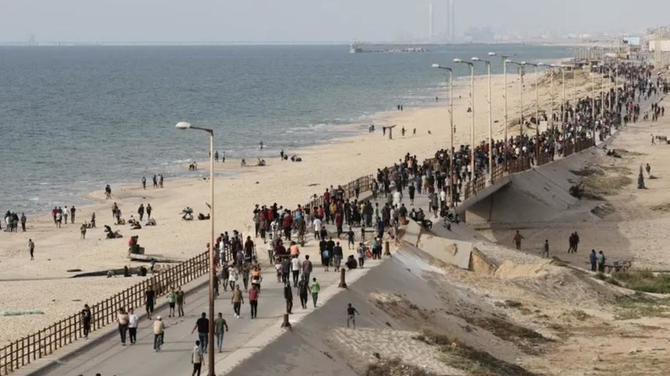
No injuries were reported and the aid pier remains fully functional, CENTCOM said in a statement, adding that no US personnel would enter Gaza.
Two of the affected vessels were now anchored on the beach near the pier and the other two were beached on the coast of Israel near Ashkelon, CENTCOM said, adding that efforts to recover the vessels were under way with assistance from the Israeli Navy.
Rising cost of medicine in Egypt poses risk to ‘thousands of pharmacies’
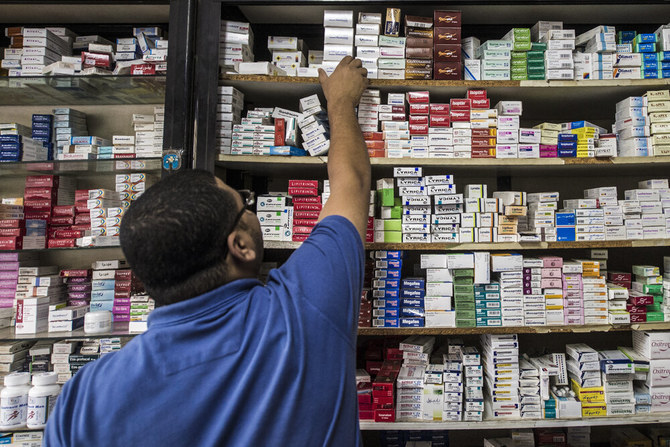
- That review followed pharmaceutical companies’ request for price increases for various medications
- The EDA’s “decisions over (recent) years to raise the prices of certain types of medicine have resulted in the closure of about 1,500 pharmacies,” said Dr. Hatem El-Badawi
CAIRO: Pharmacy owners in Egypt have voiced concerns about the rising cost of pharmaceuticals in the country as they prepare for another price increase following the Egyptian Drug Authority’s recent review.
That review followed pharmaceutical companies’ request for price increases for various medications to “offset the rising costs of production, which have been exacerbated by the devaluation of the Egyptian pound against the dollar.”
The EDA’s “decisions over (recent) years to raise the prices of certain types of medicine have resulted in the closure of about 1,500 pharmacies,” said Dr. Hatem El-Badawi, secretary-general of the Pharmacy Division at the Federation of Egyptian Chambers of Commerce, adding that the “uncontrolled” rise in medicine prices has not been matched by a corresponding increase in profit margins for pharmacists.
“We anticipate more closures in 2024,” he added. “In February, the General Federation of Egyptian Chambers of Commerce appealed to the Central Bank governor to reactivate the low-interest rate loan of 5 percent for small and medium-sized pharmacies, capped at EGP500,000 ($10,600) per pharmacy.
“The goal was to safeguard pharmacies from economic challenges such as low purchasing power, cash payment demands from pharmaceutical companies, limited liquidity, rising operating costs, and shrinking profit margins.”
That proposal was rejected, however, and loans are currently only available at a 15-percent interest rate, which is, El-Badawi said, “far higher than a pharmacist’s profit margins and thus constitutes a loss.”
Pharmacy owner Dr. Sami Saad told Arab News: “We face several problems due to price increases, including reduced profit margins for pharmacists, dual pricing for drugs, and pharmaceutical companies not recalling expired products. All these issues could force us to close at any time because we are not making any profit.”
Saad added the Egyptian Drug Authority had not considered pharmacists’ demands or the crises they are facing.
“Every day is a struggle. And although I heard that the head of the authority plans to intervene to resolve these issues, there has been no progress so far,” he said.
Dr. El-Badawi reiterated: “I fear for the closure of pharmacies — a difficult situation that will only get worse. I am concerned for the 85,000 pharmacies across the country.
“The health of Egyptians is at risk,” he added. “I urge all responsible authorities to intervene.”
More than one in four Syrians ‘extremely poor’: World Bank
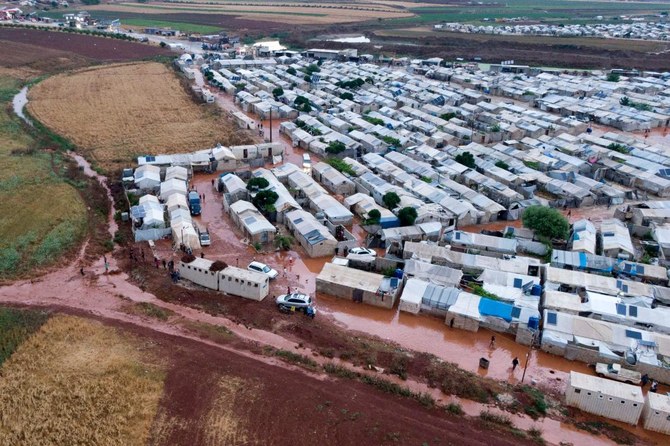
- 27 percent of Syrians — about 5.7 million individuals — live in extreme poverty
- “Continued funding shortfalls and limited access to humanitarian assistance” have further strained poor Syrians, the World Bank said
BEIRUT: More than a quarter of Syrians live in extreme poverty, the World Bank said Saturday, 13 years into a devastating civil war that has battered the economy and impoverished millions.
The World Bank published two new reports on Syria, which found that “27 percent of Syrians — about 5.7 million individuals — live in extreme poverty.”
“Extreme poverty, while virtually non-existent before the conflict, affected more than one in four Syrians in 2022” and might have further deteriorated after a deadly earthquake last year, one of the reports said.
The quake killed about 6,000 people in the country.
According to the United Nations, about 90 percent of Syrians live in poverty, while it previously estimated that around 2 million lived in extreme poverty after more than a decade of war.
The report cited neighbor Lebanon’s economic meltdown in late 2019, the Covid-19 pandemic and the war in Ukraine, as having eroded the welfare of Syrian households in recent years.
The civil war in Syria has also ravaged the economy, infrastructure and industry, while Western sanctions have added to the country’s woes.
“Continued funding shortfalls and limited access to humanitarian assistance” have further strained poor Syrians, already coping with “soaring prices, reduced access to essential services and rising unemployment,” the World Bank said.
The UN told AFP previously that its humanitarian response plan for Syria for 2024 requires more than $4 billion but that it is only six percent funded.
The international community is set to meet in Brussels Monday to try and muster funds for Syria at a yearly pledging conference.
A lack of opportunities and dwindling aid has pushed many Syrians to rely on money sent from relatives abroad to survive, with the World Bank estimating that “in 2022, the total value of remittances received by Syrian households reached about $1.05 billion.”
Syria’s estimated GDP stood at around $6.2 billion in 2023.
Syria’s “real GDP is projected to contract by 1.5 percent in 2024, extending the 1.2 percent decline in 2023,” the report said.
“Inflation is anticipated to remain high in 2024 due to the pass-through effects of currency depreciation, along with persistent shortages and potential further subsidy cuts (for) food and fuel,” it said.
Syria’s war has killed more than half a million people and displaced millions more since it erupted in 2011 after Damascus cracked down on anti-government protests.
Israel official says ‘intention’ to renew Gaza talks ‘this week’
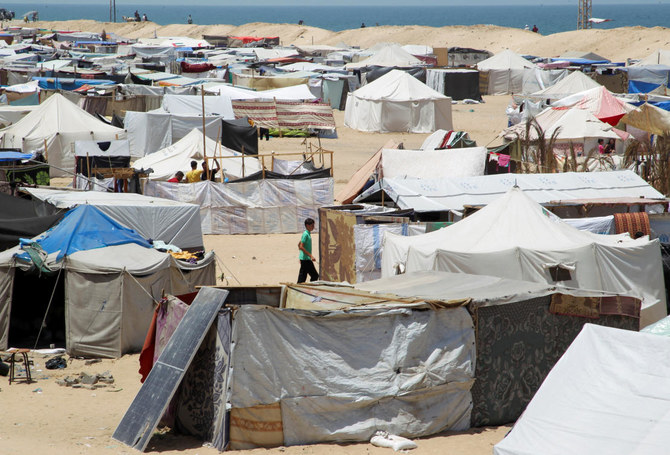
- “There is an intention to renew the talks this week and there is an agreement,” said the official
- The official did not elaborate on the agreement
JERUSALEM: An Israeli official said Saturday the government had an “intention” to renew “this week” talks aimed at reaching a hostage release deal in Gaza, after a meeting in Paris between US and Israeli officials.
“There is an intention to renew the talks this week and there is an agreement,” the official told AFP on condition of anonymity.
The Israeli official did not elaborate on the agreement, but Israeli media reported that Mossad chief David Barnea had agreed during meetings in Paris with mediators CIA Director Bill Burns and Qatari Prime Minister Mohammed bin Abdulrahman Al-Thani on a new framework for the stalled negotiations.
Top US diplomat Antony Blinken also spoke with Israeli war cabinet minister Benny Gantz about new efforts to achieve a ceasefire and reopen the Rafah border crossing, Washington said.
Talks aimed at reaching a hostage release and truce deal in the Gaza Strip ground to a halt this month after Israel launched a military operation in the territory’s far-southern city of Rafah.
The Gaza war broke out after Hamas’s October 7 attack resulted in the deaths of more than 1,170 people, mostly civilians, according to an AFP tally based on Israeli official figures.
Militants also took 252 hostages, 121 of whom remain in Gaza, including 37 the army says are dead.
Israel’s retaliatory offensive has killed at least 35,903 people in Gaza, mostly women and children, according to data from the Hamas-run territory’s health ministry.


